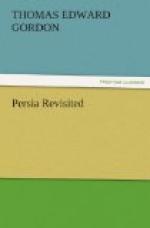The distribution of water is a most important part of village administration in Persia. The work of cutting off and letting on water with most exact observance of time-measurements is carried out by a waterman called mirab (lord of the water) whose office is hereditary, subject, however, to the special judgment of popular opinion. The duties demand a clear head and nimble foot, and the waterman, in hastening from point to point, has to show all the alertness of a street lamplighter. He has to keep a correct count of time, for water is apportioned by the hour, and his memory for all the details of change, sale, and transfer must be good and unchallenged. When he becomes too old, or otherwise incapacitated for the performance of his work with the necessary quickness, he avails himself of the assistance of a son or someone whom he proposes with the village approval to bring up as his successor. The old man is then to be seen going leisurely along the water-courses which issue from the underground channels, accompanied by his young deputy carrying the long-handled Persian spade, ready to run and execute his orders. Disputes between village and village over kanat water-cuts form the subject of severe fights occasionally, and the saying is that water and women are the main causes of village quarrels in Persia.
It was a hot day in June, and having been up before daylight so as to start at earliest dawn and avoid the mid-day heat for my whole party, we were all in the enjoyment of afternoon sleep, when the courtyard was invaded by a shouting mob of excited villagers, calling on me to hear their story and bear witness to their wounds. They said they were the tenants of the landlord whose house I was occupying, and they begged me as his guest to make a statement of their case, so that justice might be done. There had been a dispute over an irrigation channel, and the opposing side having mustered strong, they were overpowered by numbers and badly beaten. Some of the hurts they had received were ugly to look at, having been inflicted with the long-handled Persian spade, the foot-flanges of which make it a dangerous weapon. After a patient hearing, and getting some plaster and simple dressing for their cuts and bruises, they went away satisfied. So much for water as a cause of quarrel, but an instance of the other cause, woman, which had come under my notice shortly before, was more seriously characteristic. It occurred at Shamsabad, on the border of the Aberkoh Desert, between Yezd and Shiraz. I halted there after the long night journey across the desert, and immediately I was settled in my village quarters, the master of the house in which I lodged asked me to look at the gunshot wounds of one of his young men, and to prescribe and provide in any way I could towards healing them. I asked if any bones were broken, saying that I could do little or nothing in such a case. I was told that they were but flesh wounds, and on the young




